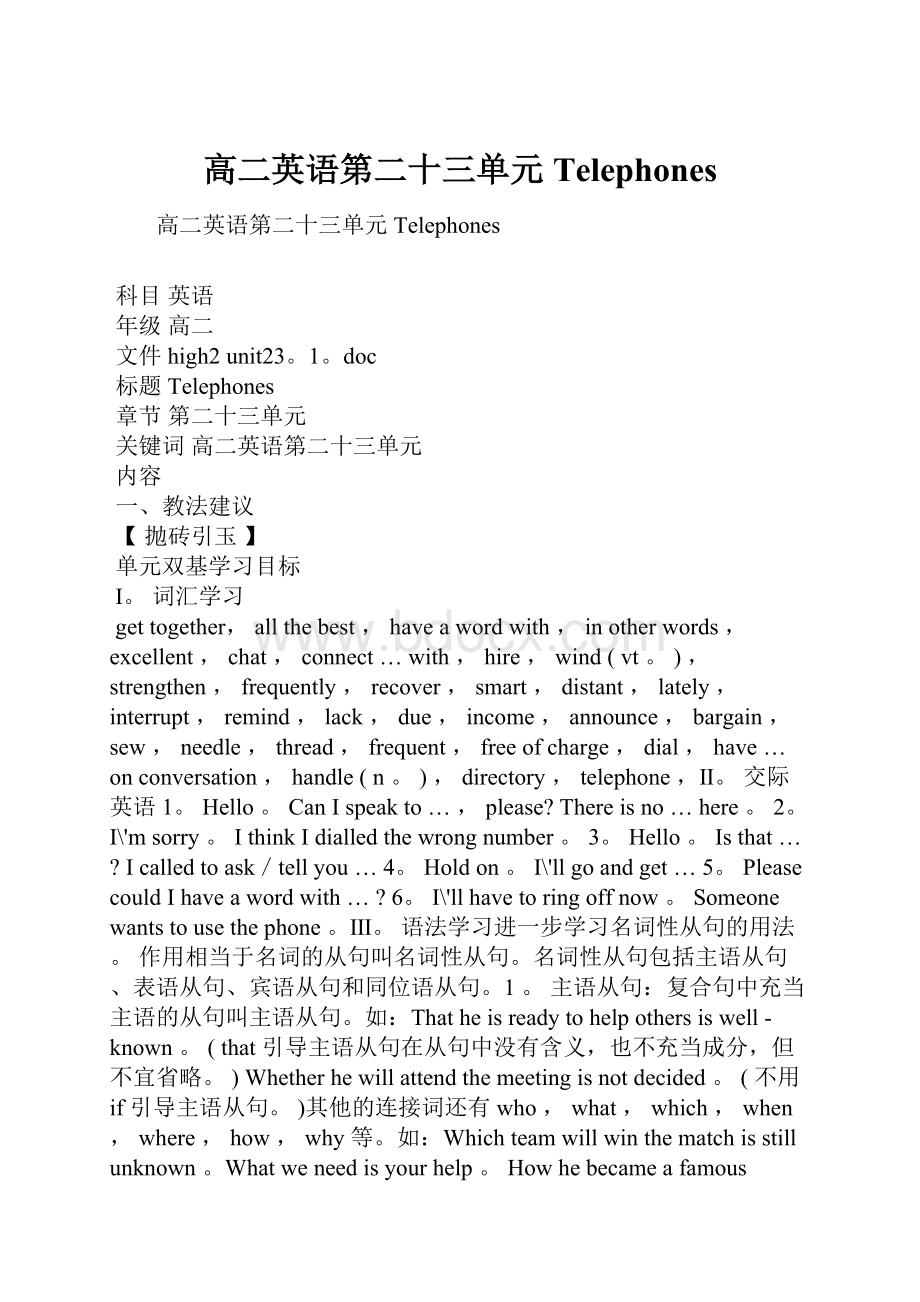高二英语第二十三单元Telephones.docx
《高二英语第二十三单元Telephones.docx》由会员分享,可在线阅读,更多相关《高二英语第二十三单元Telephones.docx(11页珍藏版)》请在冰豆网上搜索。

高二英语第二十三单元Telephones
高二英语第二十三单元Telephones
科目英语
年级高二
文件high2unit23。
1。
doc
标题Telephones
章节第二十三单元
关键词高二英语第二十三单元
内容
一、教法建议
【抛砖引玉】
单元双基学习目标
Ⅰ。
词汇学习
gettogether,allthebest,haveawordwith,inotherwords,excellent,chat,connect…with,hire,wind(vt。
),strengthen,frequently,recover,smart,distant,lately,interrupt,remind,lack,due,income,announce,bargain,sew,needle,thread,frequent,freeofcharge,dial,have…onconversation,handle(n。
),directory,telephone,Ⅱ。
交际英语1。
Hello。
CanIspeakto…,please?
Thereisno…here。
2。
I\'msorry。
IthinkIdialledthewrongnumber。
3。
Hello。
Isthat…?
Icalledtoask/tellyou…4。
Holdon。
I\'llgoandget…5。
PleasecouldIhaveawordwith…?
6。
I\'llhavetoringoffnow。
Someonewantstousethephone。
Ⅲ。
语法学习进一步学习名词性从句的用法。
作用相当于名词的从句叫名词性从句。
名词性从句包括主语从句、表语从句、宾语从句和同位语从句。
1。
主语从句:
复合句中充当主语的从句叫主语从句。
如:
Thatheisreadytohelpothersiswell-known。
(that引导主语从句在从句中没有含义,也不充当成分,但不宜省略。
)Whetherhewillattendthemeetingisnotdecided。
(不用if引导主语从句。
)其他的连接词还有who,what,which,when,where,how,why等。
如:
Whichteamwillwinthematchisstillunknown。
Whatweneedisyourhelp。
Howhebecameafamousmusicianisknowntoall。
主语从句做主语,句子显得不太平衡,因此常将它移到名子后面,前面用引导词it来作形式主语。
如:
It\'sapitythatshehadmadesuchamistake。
2。
表语从句:
用作表语的从句叫表语从句。
如:
ThatiswhyIdidn\'tattendthemeeting。
Ididn\'tknowit。
ThatisbecauseIdidn\'tattendthemeeting。
TheyarejustwhatI\'mlookingfor。
其他连词还有that,whether,asif,who,which,when,where,how,why等。
3。
同位语从句:
用作同位语的从句,叫同位语从句。
它一般跟在抽象名词(如idea,news,fact,possibility等的后面,用以说明名词所表示的具体内容。
引导同位语的词有连词that,连接副词how,when,where等。
如:
Theideathatcomputerswillrecognizehumanvoicessurprisesmanypeople。
Thepossibilitythatthemajorityofthelabourforcewillworkathomeisoftendiscussed。
注意同位语从句同定语从句的区别:
1)同位语从句的连接词that在从句中不充当成份,没有实际含义,而定语从句的连接词that在从句中常做主语或宾语。
如:
Thenewsthathetoldusjustnowisexciting。
(定语从句)Thenewsthatourteamwonthegameisexciting。
(同位语从句)2)同位语从句的连接词that在从句中不能省略,而定语从句的连接词that如果在从句中充当宾语,可以省略。
如:
Thenewsthathetoldusjustnowisexciting。
句中的that在从句中做told的直接宾语,所以可以省略。
3)同位语从句常用连接词that,连接副词when,where等常用于haveno(some)idea后。
如:
Ihavenoideawhenhewillbeback。
(同位语从句)=Idon\'tknowwhenhe\'llbeback。
IwillneverforgetthedaywhenIjoinedthearmy。
(定语从句)【指点迷津】very误用例析1。
[误]I\'mveryafraidhe\'sout。
[正]I\'mverymuchafraidhe\'sout。
[析]very不能修饰afraid,asleep,awake,alone,alive等表语形容词,这类形容词要用其他副词修饰。
如:
bewideawake,befast(deep,sound)asleep,bequitealone,beverymuchalive。
2。
[误]Thesituationseemstobeveryimproved。
[正]Thesituationseemstobeverymuch(much)improved。
[析]在没有形容词化仍有动词性的现在分词和过去分词之前不能用very,应用verymuch或much。
very只能修饰amusing,disappointing,exciting,interesting,moving,pleasing,satisfying,devoted,interested,learned,pleased,surprised,tired,worried等形容词化的分词。
3。
[误]I\'mverytiredthatIcan\'twalkabitfarther。
[正]I\'msotiredthatIcan\'twalkabitfarther。
[析]very不能替代so…that和too…to中的so和too修饰其形容词和副词。
so…that与too…to属于固定句型结构。
4。
[误]Itwasveryimpossibleforhertocatchthe9o\'clocktrain。
[正]Itwasquiteimpossibleforhertocatchthe9o\'clocktrain。
[析]very不能修饰impossible,mistaken,different,right和wrong等不可分等级的形容词。
修饰这些词时,常用quite。
5。
[误]Thebookisveryworthreading。
[正]Thebookiswellworthreading。
[析]worth是表语形容词,表示“很值得……”时,常用well修饰而不用very。
6。
[误]Heisveryanxioustoleave。
[正]Heistooanxioustoleave。
[析]句式“主语+系动词+(only,,but)too+adj。
+todosth。
”,意为“非常或+分……去干某事”,此时不用very代替too。
能用于这一句式的形容词有anxious,eager,ready,pleased,glad等。
二、学海导航【学法指要】单元重点词汇点拨1。
hire常用作动词,意为“雇用(某人)(=employ);租借(东西)(=rent)”。
例如:
Theyhiredfivemorehandsforthericeharvest。
Theyhiredaconcerthallwithaccommodationsfor300people。
2。
wind用作动词时,为不规则动词,过去式和过去分词都是wound,可以表示“(道路、河流等)弯曲,蜿蜒;(把毛线等)卷起,卷成球;(把某物)卷在(某物、人等)上,缠绕;上紧(发条)”。
例如:
Theriverwindsthroughthejungle。
Theroadwindsupthemountain。
Willyouwindthewoolintoaball?
3。
strong用作形容词,其名词形式为strength,动词形式为strengthen。
例如:
Whichdoyouthinkisstronger,alionoratiger?
Hehasaverystrongwill。
Theytookstrongmeasuresatlast。
Thelightistoostrongforthisroom。
Thiscoffeeistoostrongforme。
Hegothisstrengthbackslowlyafterhisillness。
Shedoesn\'thaveenoughstrengthtowalkupstairs。
Wewanttostrengthenourtieswiththem。
4。
interrupt意为“阻碍(某人),打断(某人)的话;使(工作、谈话等)中断,(使)终止”。
例如:
Don\'tinterrupt(me)whileIamworking。
I\'msorrytointerruptyou,butthere\'ssomeonetoseeyou。
Aflashinterruptedtheprogram。
5。
lack既可用作名词,意为“欠缺,不足”;也可用作动词,意为“缺少……,(对)……不充裕”。
例如:
Theprojectfailedduetolackofmoney。
Lackofheatmadeuscold。
Shelackedtheexperiencetogetthejob。
Theyaresorichthattheylackfornothing。
6。
need既可用作实义动词,也可用作情态动词,意为“需要”。
①用作实义词时,其后通常跟名词,带to的不定式或动词-ing形式作宾语。
例如:
Ineedyourhelp。
Herearesomeexercisesthatneedtobedoneafterclass。
Yourtelephoneneedsrepairing(=toberepaired)。
②用作情态动词,通常用在否定句或疑问句中。
例如:
“Needyougonow?
”“You,Imust。
”Youneedn\'tcometothemeetingthisafternoonifyouhavesomethingimportanttodo。
7。
announce用作动词,意为“发表……,宣布……,告知”,其名词形式为announcement。
Thegovernmentannounceditsneweconomicpolicies。
ThenewswasannouncedtothepubliconTV。
Pleaseannouncetoyourclassthattherewillbenoschooltomorrow。
Awarmsunshineannouncesthecomingofspring。
I\'dliketomakeanimportantannouncement。
8。
recognize用作及物动词,意为“认出;辩认”。
例如:
Hedidn\'trecognizemeinmydisguise。
Irecognizedhisvoiceoverthephone。
另外,recognize还可以作“承认”;“意识到”解。
例如:
Herefusedtorecognizeherashislawfulheir。
Werecognizethatcountryasanindependentstate。
单元词组思维运用1。
Allthebest。
是临别时表示祝愿的用语,相当于“Allthebestwishestoyou。
”的意思。
也可以说:
Alltheverybest。
后面还可以加适当的状语。
例如:
Allthebestinyournewjob。
Allthebestwithyourfamily。
Allthebestinyourstudy/business。
2。
haveawordwith意为“和……说句话”,其中的aword也可以用afewwords代替,表示“(说)几句话”的意思。
例如:
MayIhaveawordwithyou?
Iwanttohaveafewwordswithyou,areyoufreenow?
Theteacherwouldlikeawordwithyouinhisoffice。
IsMissMaryin?
I\'dliketohaveawordwithher。
3。
inotherwords意为“换句话说;换言之”;而ina(one)word意为“总之,总而言之”;inwords意为“用语言,用文字”。
例如:
Theyarenottherevolutionaryindeeds,butinwords。
Inaword,theyareworkingveryhard。
Anappleadaykeepsadoctoraway。
Inotherwords,eatingsomefreshfruiteverydaywilldogoodtopeople\'shealth。
Inotherwords,wecanfinishtheworkontimeonlyinthisway。
Hehasbeenworkingtoomuch,andisnotatallwell。
Inotherwords,heneedsholiday。
4。
bringalong意为“把……带来,领来”。
例如:
Iwanttobringmyfriendalongtoseeyou。
Bringyoursuitcasealongwithyou。
5。
beconnectedwith的意思是“与……有关”(=toberelatedto)。
例如:
Ialwaysconsideredyourbrothertobeconnectedwiththatclub。
Themeetingwasconnecteddirectlywiththisaffair。
Heisinnowayconnectedwiththisbusiness。
Thediscussionwillbeconnectedcloselywithourwork。
6。
gowrong意为“出了毛病”。
“go+adj。
”表示“转变成……”,go是连系动词,意为“变得”。
这个结构常表示情况变坏。
例如:
Whatcanbedoneinordertomakesurethatnooneintheworldgoeshungry?
Themachinesgowrong。
Hewentalmostmadwhenheheardthenews。
Hisillnessisgoingworse。
7。
haveon(=bewearing)穿(戴)着,表示状态,无进行时态,但有动词-ing短语形式。
例如:
Themanhavingnothingonwalkedinthewools。
puton表示穿的动作,wear表示穿的状态。
两者后均跟表示服装的名词作宾语,wear还可以表示戴手表,眼镜,首饰,花等。
in表示穿的状态,但它除接表示服装的名词外,还可接表示颜色的名词。
例如:
Heputonhisraincoatandsoondisappearedintherain。
Theman,wearingblackglasses,isinblue。
dress既可用作及物动词,也可用作不及物动词。
用作及物动词,后面只能跟表示人的名词或代词(表示自己穿衣时用反身代词),不能跟表示服装的名词。
例如:
Afterthebath,hedressedhimself。
Shehurriedlydressedherdaughterandtookhertothezoo。
Thebeggarwaspoorlydressed。
(过去分词dressed用作表语,表示穿的状态。
)Getupanddressquickly。
pullon,haveon,puton均为“动词+副词”构成的短语动词,这类短语动词当其后的宾语为名词时既可放在两词中间,也可放在副词后;若其后的宾语为代词时,则宾语只能放在两词中间,如“你今天不必戴帽子。
”可译为:
Youdon\'tneedtoputonyourcaptoday。
Youdon\'tneedtoputitontoday。
(“it”refersto“yourcap”here;Wecan\'tsay“putonit”)8。
incase用作连词,意为“在……的情况下,万一……的话”;“以防,免得”。
例如:
Incaseanythingimportanthappens,pleasecallmeup。
Takeataxiincaseyouarelateforthemeeting。
IncaseIforget,pleaseremindmeofit。
incaseof“万一,以防”,后面跟名词。
如:
Incaseoffire,dial119。
Takeyourraincoatincaseofrain。
单元难点疑点思路明晰1。
Wouldyoulikeawordwithher?
你想和她说几句话吗?
aword=afewwords与某人说话交谈haveawordwithsb。
=haveafewwordswithsb1)IsMaryin?
Iwanttohaveafewwordswithher。
与word有关的常用词组。
addressafewwordstosb。
对某人讲几句话breakone\'sword失信,食言nottobreatheawordaboutsth。
对某事只字不提eatone\'swords收回前言,承认说错getword获得消息,听说,得知giveone\'sword保证,担保,允诺haveawordwith和某人谈谈keepone\'sword守信用,遵守诺言matchwordswithdeeds言行一致inword口头上wasteone\'swords白费口舌thelastwords临终遗言sharpwords苛刻的话softwords甜言蜜语havenowordsforsth。
无法用语言形容某物inaword总之2。
I\'vealreadygotsomethingonthisevening。
我今天晚上已有安排。
havesth。
on有(约会,聚会等)安排Ihavenothingontomorrowevening。
明天晚上我没有约会。
Doyouhaveanythingonfortonight?
你今晚有什么事吗?
have…on穿着,戴着=wear。
Maryhasareddressontoday。
Whatdoyouthinkofthetiehehasontoday?
3。
Allthebest。
祝你万事如意。
Allthebest是临别时的祝愿用法,=Allthebestwishestoyou。
=Alltheverybest,(可接状语)。
Allthebestinyourstudy。
祝你学习顺利。
Allthebestwithyourfamily。
祝你全家都好。
表示祝愿的说法:
※luckGoodluck。
Goodluckwithyou。
Goodluckintheexamination。
※wis